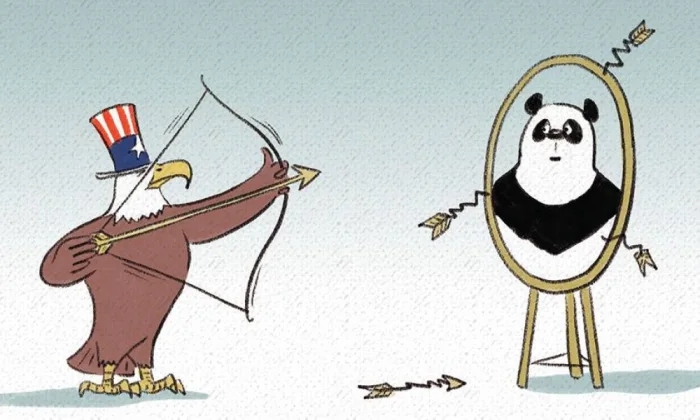
Illustration: Liu Rui/GT
Amid strained China-US relations, US politicians are continuing to add fuel to the fire by passing anti-China bills, which has become a habitual tyrannical action that will make the bilateral relations even harder to change for the better.
On Monday, the governor of the US state of Florida Ron DeSantis signed three malicious bills in a bid to counter what he referred to as the US' "greatest geopolitical threat" -- the Communist Party of China (CPC). The three bills ban the purchase of US farmland and land near US military bases and critical infrastructure by Chinese agents, stop sensitive digital data from being stored in China, and stop CPC influence in the US education system.
These bills are reawakening the hatred and panic toward Chinese Americans in the US and fanning the flames of suspicion and hostility against China. They are reminiscent of the despicable1882 Chinese Exclusion Act and Alien Land Laws passed in numerous states between the 1880s and 1920s.
For Chinese Americans, racism is a shadow that they cannot get rid of. In late April, the largest survey of Chinese Americans ever completed by Columbia University and Committee of 100 showed that 74 percent of Chinese Americans have experienced racial discrimination in the past 12 months and 55 percent worry about their safety relating to hate crimes or harassment.
Obviously, DeSantis is politically manipulating China topics and trying to de-Sinicize his state. Zhang Tengjun, deputy director of the Department for Asia-Pacific Studies at the China Institute of International Studies, told the Global Times that DeSantis' mentality toward China is a typical Trump-like conservative one that stresses the interests of locals and elites. He has a strong attachment to the deep-rooted US exceptionalism and supremacism and hopes to make America great again, while hyping China-related issues can help him achieve his agenda.
US states of Florida, Texas and Virginia are all red states and play an active role in hyping China-related issues. In late April, the Texas senate passed a bill putting restrictions on land purchases by citizens of China, Iran, Russia and North Korea, all of which are deemed by the US as adversaries. Virginia Governor Glenn Youngkin has also tried to ban agricultural land sales to certain entities tied to the CPC. Arrow-like figures such as DeSantis represent the voices of some Republican states and exploit China-related issues to seek political gains.
"Florida is not alone. It is not necessarily the most anti-China US state. As the US 2024 election season begins, more states may follow suit, and bills that are even more anti-China may be passed," said Zhang.
DeSantis previously did not jump high in his anti-China stance. It is obvious that he is now presenting himself as an anti-China model under the current China-phobia for the sake of the 2024 elections. The 2024 Republican primary could well turn into a contest between former US president Donald Trump and the Florida governor.
"Trump always claims himself as the right person to protect US security, and national security is a topic that many American people care about. DeSantis cannot compete with Trump in this regard, as he has no experience in governance at the federal level. Restricting the Chinese people with the excuse of national security in his own state can make up for his shortcomings," said Zhang Jiadong, a professor at the Center for American Studies, Fudan University.
In recent days, from the US Congress to state governments, they have frequently proposed, discussed and pushed forward anti-China bills in all spectrums. The US' China policy has shown the distinctive features of being signed into laws and being affected by US domestic politics. Zhang Tengjun believes that although foreign affairs are in the president's authority, states and Congress are intervening. This has something to do with anti-China factors as well as struggles between states and the federal government and struggles between the White House and the Congress.
"The tyranny of 'state bills' will not end soon. This means the White House will face more constraints and barriers in its dialogue with China, and makes the current China-US atmosphere even harder to reverse," said Zhang.
"What's worse, the Democratic Party and the Republican Party are competing to prove which side is tougher against China, so they will carry out more cheap and mean plans and fixate them in legal forms. The political and decision-making culture in which the US political elites arbitrarily and arrogantly pursue their own absolute superiority will do infinite harm to future China-US relations," the scholar added.




